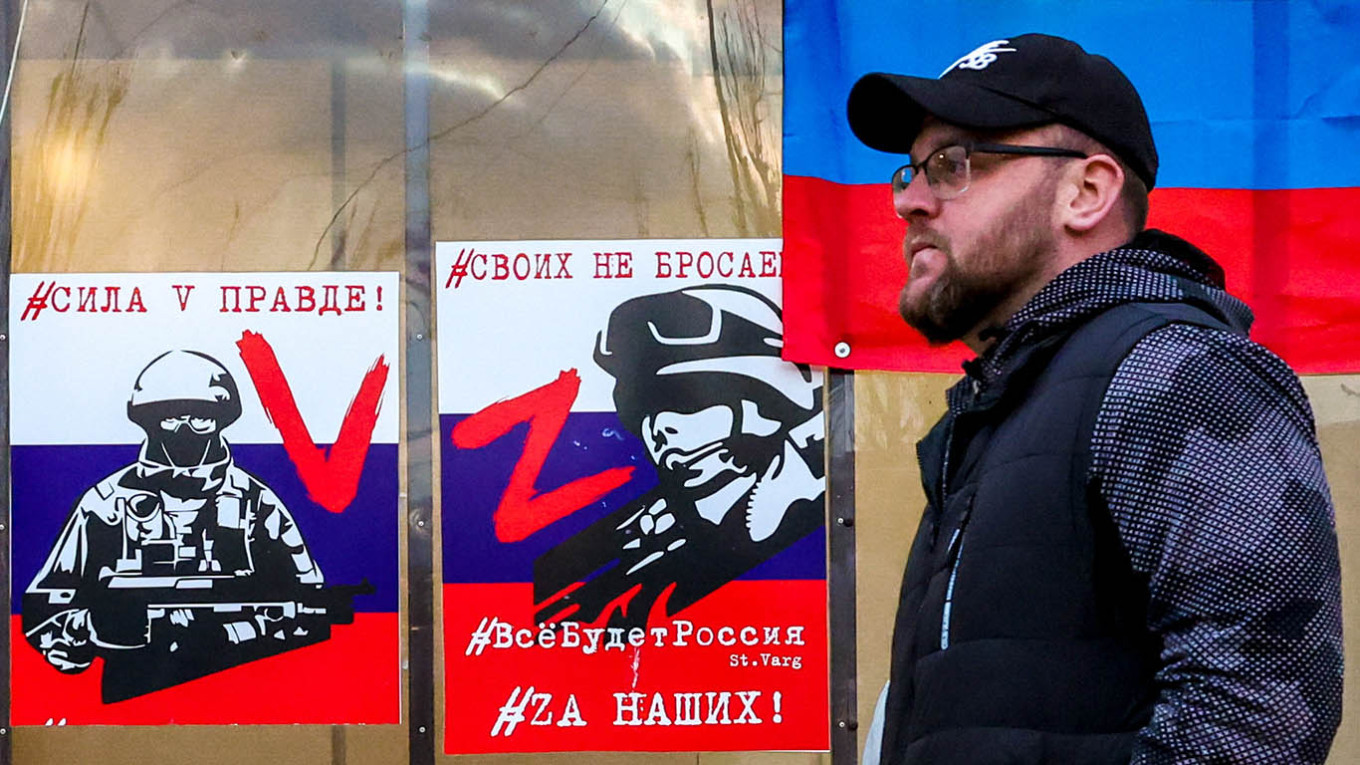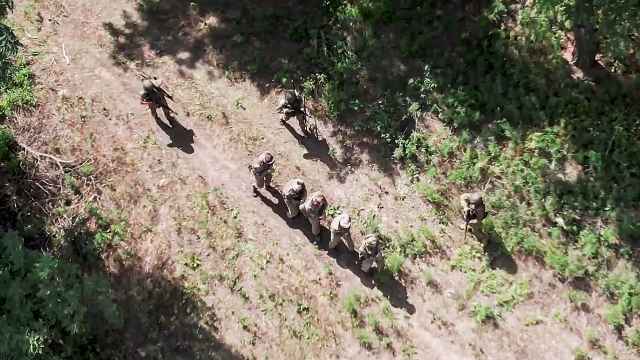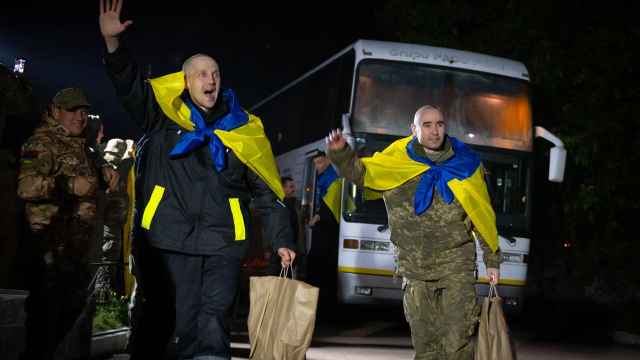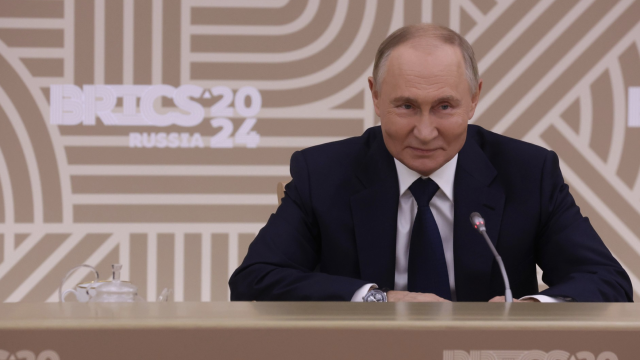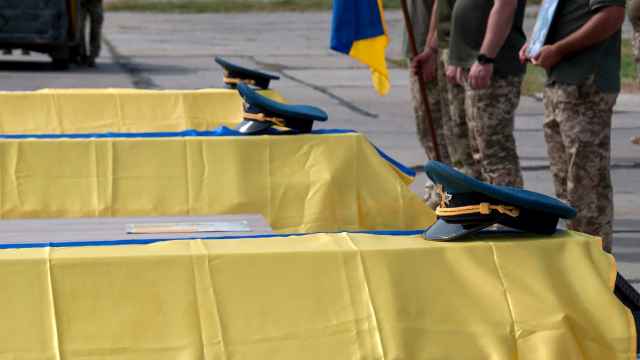Talks between Donald Trump and Vladimir Putin in Alaska sparked unease among Russia’s most outspoken pro-war bloggers, many of whom fear that the Kremlin could agree to end hostilies without achieving its stated goals in Ukraine.
A sprawling ecosystem of pro-war Telegram channels has emerged since the full-scale invasion. While loyal to Putin and the war effort, they have rarely spared criticism for the Defense Ministry or even the government.
These commentators, many of whom have direct links to the front lines and audiences in the millions, now worry that a territorial swap or premature ceasefire could not only undermine Russia’s battlefield gains — but also put the bloggers themselves in an increasingly vulnerable position.
The choice of Alaska as the location for the talks drew particular scorn.
“It’s hard to imagine a greater humiliation,” wrote pro-Russian blogger Alexei Larkin. “Not in neutral territory, but in the U.S. — and not even in Washington, but in the backwoods, where the rednecks and bears live. A place that was once ours that we sold off for pennies and still feel insecure about.”
Larkin warned that Trump would either force Russia to end the war or paint its leadership as unwilling to negotiate.
Other prominent voices accused Putin of preparing to trade away occupied territory and “betraying Russia’s interests.”
"In exchange for the [Donetsk People’s Republic], the shameless [Putin] is reportedly ready to give up footholds in the Sumy and Kharkiv regions, the Zaporizhzhia Nuclear Power Plant, the Kinburn Spit and even Nova Kakhovka. That’s why Trump considers this proposal very favorable for the Ukrainians," wrote Alex Parker Returns.
He also noted that Russian state media is already shifting its messaging to prepare the public for the end of the war.
Another, Verum Regnum, warned that any “territorial exchange” would render Russia’s Constitution meaningless.
“We hope this is impossible under any circumstances,” wrote Verum Regnum.
Some bloggers concluded that the very fact of a summit signaled a deal was already in place.
“Apparently, we’re talking about freezing the conflict along the current front line,” wrote pro-war journalist Maxim Kalashnikov on the Roi TV channel.
“The American leader has pressured our leadership: ‘If you want to keep fighting, you’ll end up with an economic, social and political crisis’,” Kalashnikov wrote, arguing that the Russian army has shown itself to be weak, outdated and unable to achieve major gains.
Still, not everyone had negative things to say about the summit.
Pro-Kremlin ideologue Alexander Dugin praised the meeting as a “grand” diplomatic victory for Putin.
“To win everything and lose nothing — only [Romanov tsar] Alexander III could do that,” Dugin wrote. “There’s much more to come. But as always, the scariest thing for us is peace talks.”
Other channels noted that Ukrainian forces are still fighting with American weapons, and Russian propaganda has long cast the war in Ukraine as a war between Russia and NATO.
“What really hurts is that all the guys who died on the battlefields will never see the happy faces of our politicians in Alaska, or learn that the U.S. is apparently not our sworn enemy wishing us death, but rather our friend we need to make peace with. They can’t be brought back,” wrote the author of the channel Call Sign OSETIN.
Many pro-war bloggers believe that Russia should not only refuse to give up occupied territories, but also avoid stopping at the current front line, says writer Ivan Filippov, who analyzes pro-Russian blogs on his Telegram channel.
"For the most part, they believe that stopping at what’s been conquered will just lead to a postponed war, and that the fighting must continue until Victory. What ‘Victory’ means, however, varies from person to person," Filippov told The Moscow Times.
In a column for the Vot Tak media outlet, Filippov wrote that pro-war bloggers have trapped themselves in a rhetorical loop.
“Their thinking goes in circles every time,” wrote Filippov. “They say giving up territory is unacceptable — so we must fight. But the war will drag on for years at our current pace of fighting. To speed it up requires total economic and societal mobilization, which isn’t happening. Instead, Putin goes to Alaska to meet his dear partner Donald. So, are they going to make a deal? And trade ‘Russian territories’? And… we’re back at square one.”
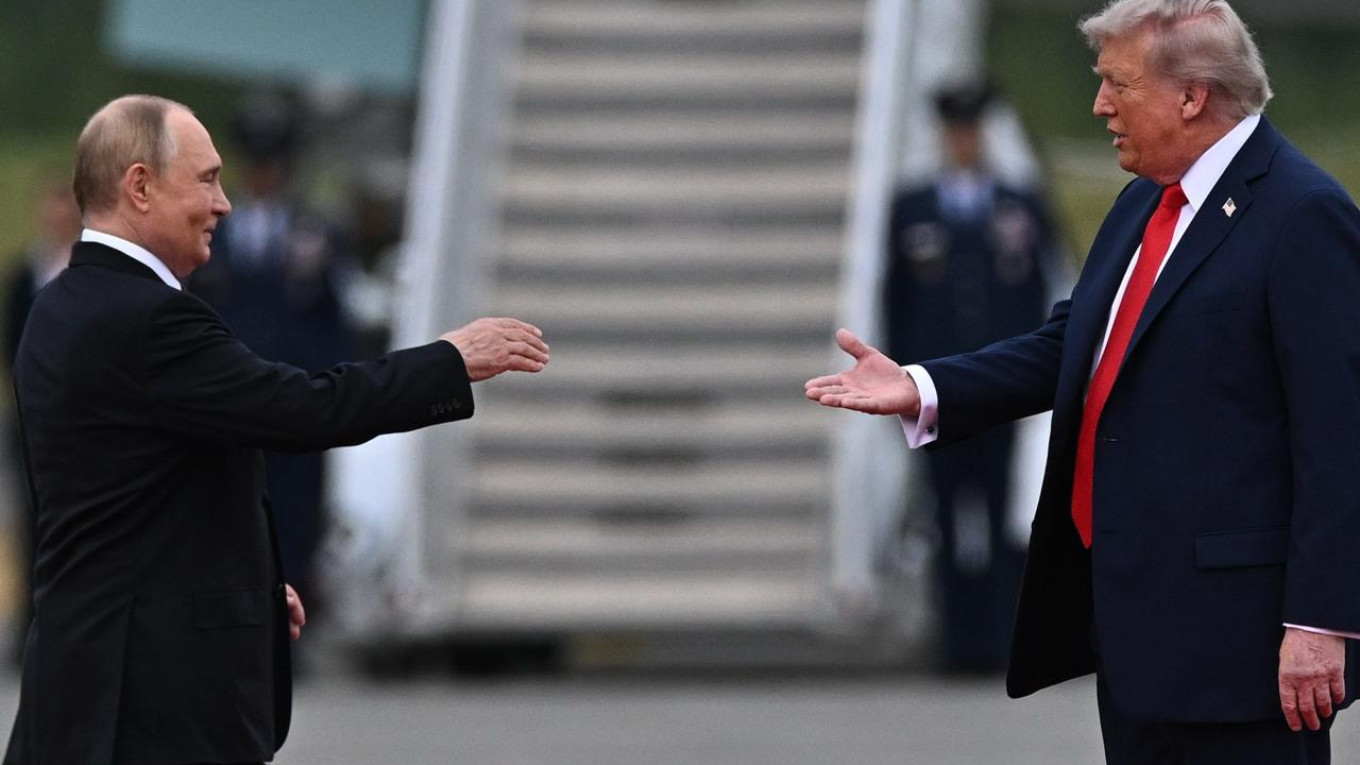
Even before the U.S.-Russia summit, pro-Russian Telegram channels had regularly complained about the slow pace of advances, heavy losses, incompetent command and the lack of broad financial support from the Russian public.
Recent battlefield developments have done little to dispel this frustration.
Russian gains near the Ukrainian stronghold of Pokrovsk in Donetsk last week were quickly offset by Ukrainian counterattacks, and even pro-Kremlin outlets acknowledged the lack of a decisive breakthrough.
"Reports from the Pokrovsk sector sound promising, there are successes, but not the kind shown on the painted maps. Additional Ukrainian forces are being redeployed there and they continue to heavily fortify their positions," wrote the channel DONTSTOPWAR.
“Nothing fundamentally new happened. The war continues as a bloody meat grinder,” wrote Kalashnikov on the Roi TV channel. “No matter how much you twist and turn diplomatically, nothing will compensate for the missed opportunities of 2014 and 2022.”
At the same time, bloggers are voicing fears that they, too, could soon fall victim to tightening censorship and persecution at home.
Military volunteer Roman Alekhin mocked a new law banning web searches for “extremist” materials as an Orwellian ban on “freedom of thought itself.”
Others note the jailing or silencing of figures like Igor Girkin — a former separatist commander who was imprisoned after he criticized the war effort — as a sign that the Kremlin may soon move against them more broadly, viewing them as “unnecessary” and “overly active patriots.”
A blogger known as Trinadtsatiy (“The Thirteenth”), a man who fought in Ukraine and who has occasionally criticized the Russian authorities, disappeared after he claimed on Aug. 5 that “armed men” were looking for him.
“If I go offline, don’t be surprised. That’s how it is,” he wrote.
And Girkin associate Pavel Gubarev — who fought in the Donbas in 2015 and later took part in the full-scale invasion of Ukraine — has also scaled back his activity. He was once known for criticizing the Kremlin.
“All the inconvenient ones will be purged,” warned blogger and former police investigator Kirill Kichur. “The Kremlin isn’t afraid of the liberals. They fear those with weapons and a patriotic audience.”
Filippov argued that as long as the war continues, authorities are unlikely to fully dismantle the pro-war blogger ecosystem, which also provides critical logistical and fundraising support to the army.
But once the conflict ends, he predicts, most of these channels will be shut down.
“The Russian authorities cannot tolerate grassroots self-organization, especially among people who supply military goods and coordinate directly with armed men,” he told The Moscow Times. “That’s why I think they’ll just be preemptively purged.”
A Message from The Moscow Times:
Dear readers,
We are facing unprecedented challenges. Russia's Prosecutor General's Office has designated The Moscow Times as an "undesirable" organization, criminalizing our work and putting our staff at risk of prosecution. This follows our earlier unjust labeling as a "foreign agent."
These actions are direct attempts to silence independent journalism in Russia. The authorities claim our work "discredits the decisions of the Russian leadership." We see things differently: we strive to provide accurate, unbiased reporting on Russia.
We, the journalists of The Moscow Times, refuse to be silenced. But to continue our work, we need your help.
Your support, no matter how small, makes a world of difference. If you can, please support us monthly starting from just $2. It's quick to set up, and every contribution makes a significant impact.
By supporting The Moscow Times, you're defending open, independent journalism in the face of repression. Thank you for standing with us.
Remind me later.



